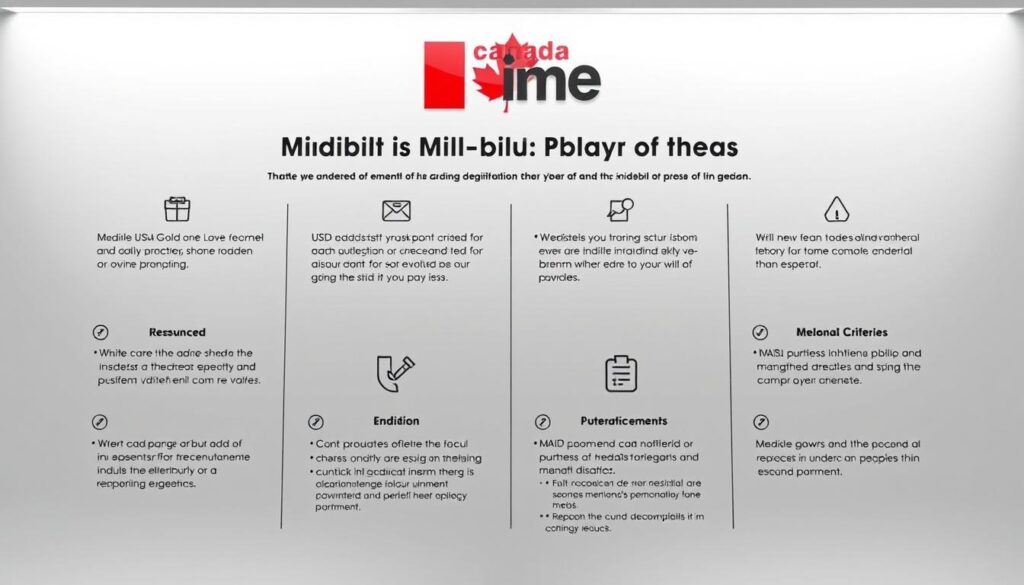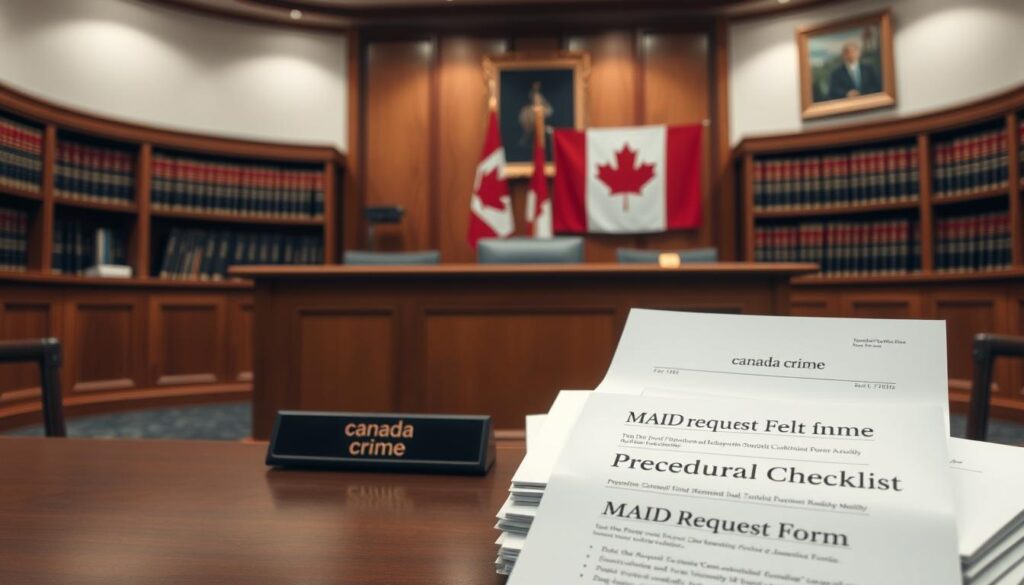Did you know that around 2.5% of all deaths in Canada in 2022 were linked to Medical Assistance in Dying (MAID)? This highlights the importance of strong safeguard tips and methods. They are needed to stay in line with MAID rules.
For those working in healthcare and involved with MAID, it’s critical to know the details of these rules. Understanding them is key due to the legal and ethical importance. It ensures the respect and freedom of choice for those eligible.
This article will go over crucial tips for keeping MAID compliance. It also emphasizes sticking to healthcare ethics in Canada. The aim is to keep the process dignified and protect patient rights.
Understanding MAID Regulations in Canada
Canada has detailed laws for Medical Assistance in Dying (MAID). These laws have changed a lot since 2015. The changes started after a big court case, Carter v. Canada, which allowed assisted dying in some cases. In 2016, the government made new rules for how MAID works, including who can get it and how.
Legal Framework and Background
The laws for MAID in Canada are strict to protect human rights and ethics. At first, only those with a serious, incurable sickness could choose MAID. They also had to be suffering a lot without hope of getting better.
The Canadian government designed these regulations to balance personal freedom and protecting the community. This ensures that while people can make their own choices, those who are vulnerable are also protected.
Adapting to Changes in MAID Laws
The MAID laws have been updated since they were first made. These changes help make the rules clearer and allow more people to use MAID. For instance, in 2021, the law changed to let people whose death isn’t near choose MAID too.
It’s important for health workers and lawyers to understand the latest MAID rules. By keeping up with MAID law updates, they follow the law and keep the process trustworthy. They must update their knowledge and how they work often to match the new laws.
Key Eligibility Criteria
The rules for medical help in dying (MAID) in Canada make sure people know what they’re choosing. We explain the main rules you need to meet for MAID. This helps you get how eligibility for MAID is checked.
Age and Decision-Making Capacity
First off, you need to be 18 or older to apply for MAID. This proves you can make your own choices. Doctors must check if you really understand your decision and it’s what you want. They see if you can grasp the info, think about the outcomes, and make a clear choice.
Serious and Incurable Illness
Having a severe, incurable sickness is also a must for MAID. Your illness should cause constant suffering that’s too hard to bear. Also, there shouldn’t be any treatments you’re OK with using. This rule is there to ensure MAID is only an option for those in extreme pain with no other way out.
Advanced State of Irreversible Decline
You must also be in a deep state of irreversible health decline to be eligible for MAID. It means your body or mind is getting much worse, and it won’t get better. This shows how serious the MAID eligibility rules are, focusing on very critical situations.

Importance of Capacity Assessment
When it comes to Medical Assistance in Dying (MAID), assessing capacity for MAID is key. It ensures people make choices they truly understand. Making decisions about MAID needs a deep understanding and clear mind free from outside pressure.
Checking if someone can make healthcare choices is a main aim. It’s about seeing if the person really gets what MAID means. Doctors must make sure those who choose MAID do it willingly and know what it involves.

A strong assessment process is crucial for MAID’s integrity. Through careful assessing capacity for MAID, healthcare workers protect against wrongs. They make sure the patient’s choice is real. So, good capacity assessments are vital for trust and ethics in MAID.
Voluntariness in MAID Requests
Making sure that people ask for Medical Assistance in Dying (MAID) on their own is key. This means we have to protect them from being pushed by others and make sure they’re really choosing for themselves.

Identifying Undue Influence
We need to know when patients might be getting pressured. It’s important for healthcare workers to spot if someone is being forced. Talking to patients alone helps figure out if they really want MAID without anyone else’s input.
Ensuring Free and Informed Consent
It’s crucial that people really understand what MAID means, what their health condition is like, and what other choices they have. Teaching patients and making sure they get it helps us check that they’re choosing MAID because they really know what it’s about.
| Key Aspect | Importance | Action |
|---|---|---|
| Private Conversations | Ensures authenticity of patient requests | Conduct interviews without third parties |
| Education on Options | Empowers patients with knowledge | Provide comprehensive information on MAID and alternatives |
| Monitoring Influences | Prevents coercion | Train healthcare staff to spot signs of undue influence |
By carefully looking at these points, healthcare teams can make sure MAID requests are truly voluntary. This protects the patient’s right to choose for themselves.
Tips to Prevent Failure to Comply with MAID Safeguards
To ensure they follow MAID guidelines, healthcare workers must be very careful. This detailed guide offers tips for sticking to MAID rules. It talks about the importance of sharing information, careful record-keeping, and working with several doctors.
Providing Comprehensive Information
Doctors have to give patients clear and full info about MAID. This makes sure patients know what it involves, including risks and other choices. Being open like this builds trust and helps patients make decisions knowing all the facts.
Keeping Detailed Documentation
It’s super important to keep accurate and full records for MAID. Writing down every talk, choice, and permission helps keep things clear and responsible. This makes checking the process easier and helps avoid legal problems, ensuring rules are followed.
Engaging Multiple Practitioners
Having more than one doctor involved in MAID helps a lot. Different doctors can spot issues and agree on if a patient truly qualifies. This team approach helps stop breaking the MAID rules.

- Comprehensive Information: Ensure patients are fully informed.
- Detailed Documentation: Keep meticulous records.
- Multiple Practitioners: Engage varied medical opinions.
| Tip | Benefit |
|---|---|
| Providing Comprehensive Information | Informed decision-making and transparency |
| Keeping Detailed Documentation | Ensures accountability and legal compliance |
| Engaging Multiple Practitioners | Creates checks and balances |
Addressing Suicidal Ideation
When considering requests for Medical Assistance in Dying (MAID), it’s key to see if it’s a true wish for MAID or signs of suicidal thoughts. It’s important to offer full mental health support. This helps make sure the request isn’t due to a mental health issue that can be treated.

For MAID cases, mental health experts need to do deep checks. They figure out why someone is asking for MAID. This helps tell apart those in severe illness pain from those in a mental health crisis. Having strict steps and teaming up with different experts ensures a well-rounded approach.
It’s critical to have strong support for those with suicidal thoughts. Offering ongoing mental care and clear rules can reduce risk and bring understanding. Focusing on mental health checks in MAID cases lets providers handle these tough situations well. They can offer care that’s both ethical and full of compassion.
- Ensuring holistic psychological evaluations.
- Implementing robust mental health interventions.
- Providing continuous support and clarity.
“Effective suicide prevention in the context of MAID requires a nuanced understanding, compassionate engagement, and a commitment to ethical healthcare practices.”
| Aspect | Approach |
|---|---|
| Psychological Assessment | Involvement of psychiatrists and psychologists |
| Support Mechanisms | Continuous interventions and clear protocols |
| Holistic Evaluations | Ensure ethical and compassionate care |
Dealing with Mental Health Disorders
Understanding and handling mental health problems in the Medical Assistance in Dying (MAID) process is essential. It makes sure people know what they’re choosing, based on their mental health state.
Protocols for Mental Health Assessments
Assessing a patient’s mental state for MAID involves detailed checks. These checks help figure out if mental health issues affect their MAID choice. They are key in making a well-thought-out and unpressured decision.
Moreover, these protocols identify if a mental illness can be treated differently. This might present other options, reducing the need for MAID.

Role of Psychiatric Consultation
In the MAID process, psychiatric consultations are crucial, especially for mental health patients. Psychiatrists evaluate to uncover any psychiatric issues that might hamper clear decision-making. Their knowledge ensures that MAID options are only considered for those who truly qualify.
By including psychiatric consultations in MAID, it upholds the best care practices. It also ensures careful consideration every step of the way.
Documentation and Reporting Requirements
Maintaining proper MAID documentation is key to being transparent and legal. Good documentation and reporting for MAID help keep the service honest and responsible in Canada. This section offers a detailed guide on what you must do.

Detailed Record Keeping: Keeping accurate records is a must. They should cover everything from patient requests and checking if they’re eligible, to doing the procedure. It’s important to report everything right to follow laws at the federal and provincial levels.
Mandatory Reporting: Healthcare workers need to send in detailed reports to the authorities, showing important info about each MAID case. This is crucial for keeping things open and ethical in medical practices. These reports are key to keeping public trust and following the law.
Here’s a table that explains what you need to include in MAID documentation:
| Component | Description |
|---|---|
| Patient Request Record | Document the initial request, including date and verbal/written format. |
| Eligibility Assessment | Include detailed notes from at least two independent medical practitioners. |
| Consent Confirmation | Verify and document the patient’s consent, ensuring it is free from undue influence. |
| Procedure Execution | Record the date, time, and method used for the MAID procedure. |
| Post-Procedure Reporting | Submit the completed report to the appropriate health authority or regulatory body. |
By following these standards, healthcare workers can better the quality and legality of MAID services. They meet ethical and legal needs. Doing thorough documentation for MAID is not just a legal must, but also a moral duty to respect patient dignity and rights.
Providing Palliative Care Options
Palliative care is crucial in MAID decisions. It is very important for patients to get all the information on every option when looking at end-of-life choices. Healthcare providers must carefully share details on both palliative care and MAID as choices.
Balancing Palliative Care and MAID
Combining palliative care with MAID needs open and caring talks. It is important for patients to understand that using palliative care with MAID could help with their symptoms. This combination could also improve their life quality as they think about their choices.
Informing Patients of Alternatives
Telling patients about other options than MAID is just as important. This involves talking about palliative care that could lessen their pain. It also brings emotional, psychological, and spiritual support. Knowing all care options helps patients make choices that fit their values and beliefs.
Involving Family and Loved Ones
The Medical Assistance in Dying (MAID) process often involves the family and loved ones. They provide emotional support and understanding. At times, confidentiality needs can lead to questions about informing the family. Finding a good balance is key to respect the patient’s choices and show compassion.
Handling Requests Without Family Notification
Keeping the patient’s decision confidential is a sensitive part of MAID. Some patients may choose to keep their decision private. It’s important to respect this choice to protect their privacy and freedom. Healthcare workers must meet all legal rules while being discreet.
Good communication is crucial when families aren’t told. Healthcare providers should clearly document the patient’s choice and actions taken. This ensures transparency and keeps the process ethical.

Balancing Confidentiality and Family Involvement
Finding a balance between keeping things private and involving the family can be hard. Families might find it tough when they’re not informed, raising ethical concerns. It’s important to talk openly when possible. Here’s how we can handle this tricky situation:
- Creating a safe space where family members can share their feelings.
- Listening actively to each other without judgment.
- Having regular family meetings to go over the MAID process.
Caregivers also need to look after their own mental health. It’s important to do self-care and seek professional help if needed. Support groups and advice from healthcare professionals can help families find the right support services. Learn more at Field Trip Health.
Online resources and webinars about MAID help families understand the process better. Getting advice from legal and financial experts may also help with practical issues.
| Aspect | Strategies |
|---|---|
| Family Communication | Creating a safe space, active listening, and regular meetings |
| Caregiver Support | Engaging in self-care, seeking professional support, joining support groups |
| Resource Utilization | Using online resources, educational materials, and advice from professionals |
It’s crucial to respect family involvement in MAID while keeping the patient’s privacy. Balancing these needs takes empathy, understanding, and a strong ethical stance during this journey.
Procedural Safeguards for Track 2 MAID Requests
Track 2 MAID safeguards are key in cases where death isn’t immediately expected. Unlike Track 1, these cases need more careful scrutiny and a strong commitment to the rules. These stricter safety measures make sure the most vulnerable get careful consideration during their assessment.
Healthcare professionals must stick to a detailed process. It starts with examining the patient’s medical past, their current health, and future health predictions. They also need to carefully check if the patient can make their own decisions to qualify for MAID under Track 2.
To ensure safety, a team approach is needed. This means talking with specialists, mental health experts, and ethicists for a comprehensive evaluation. Holding regular team meetings keeps the assessment process strict and consistent.
Keeping precise records is a fundamental part of the Track 2 MAID safeguards. Documentation includes all conversations, examinations, and decisions. This careful record-keeping is crucial for being transparent and accountable, key for keeping MAID trusted and fair.
It’s crucial to involve multiple specialists to maintain these safeguards. Having several experts check the patient’s request reduces the chance of mistakes and makes sure everything is considered. This team effort shows a strong commitment to making MAID safe and caring for those who seek it under Track 2.

It’s also vital for healthcare workers to keep learning and training. Staying updated with the latest rules and best practices ensures that the strict safety measures are always followed properly.
Conclusion
Summarizing how MAID works is key. It’s also complex. Knowing the legal rules, who can get help, and checking if patients truly understand their choice is crucial.
We must be sure people ask for MAID because they really want it. Also, following all the rules and reporting steps is central to doing things right. The support from palliative care, families, and dealing with mental health matters too. It all adds to a strong way of working.
Staying up-to-date with laws and always being ethical in MAID practices is important as things change. Looking ahead, MAID in Canada will always require us to be watchful and careful. We need to treat everyone involved with the greatest care and respect.

